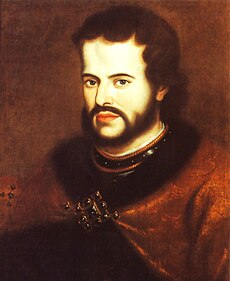Ivan V of Russia
| Ivan V | |||||
|---|---|---|---|---|---|
 |
|||||
| Tsar of All Russia | |||||
| Reign | 7 May 1682 – 8 February 1696 | ||||
| Coronation | 25 June 1682 | ||||
| Predecessor | Feodor III | ||||
| Successor | Peter I | ||||
| Co-monarch | Peter I | ||||
| Regent | Sophia Alekseyevna (1682–1689) | ||||
| Born |
6 September 1666 Moscow |
||||
| Died | 8 February 1696 (aged 29) Moscow |
||||
| Burial | Archangel Cathedral | ||||
| Consort | Praskovia Saltykova | ||||
| Issue | Tsarevna Maria Ivanovna Tsarevna Feodosia Ivanovna Catherine, Duchess of Mecklenburg-Schwerin Empress Anna of Russia Tsarevna Praskovia Ivanovna |
||||
|
|||||
| House | House of Romanov | ||||
| Father | Alexis | ||||
| Mother | Maria Miloslavskaya | ||||
| Religion | Eastern Orthodox | ||||
| Full name | |
|---|---|
| Ivan Alekseyevich Romanov |
Ivan V Alekseyevich (Russian: Иван V Алексеевич, 6 September [O.S. 27 August] 1666 – 8 February [O.S. 29 January] 1696) was a joint Tsar of Russia (with his younger half-brother Peter I) who co-reigned between 1682 and 1696. He was the youngest son of Alexis I of Russia by his first wife Maria Miloslavskaya, while Peter was the only son of Alexis by his second wife Natalya Naryshkina. Ivan's reign was only formal, since he had serious physical and mental disabilities. He sat still for hours at a time and needed assistance in order to walk.
Ivan V was the 12th child of Tsar Alexis, but he had only two older brothers who reached adulthood. His eldest brother, Alexei, died aged 16 in 1670, and therefore the second brother, Feodor III, became Tsar upon the death of their father. However, Feodor suffered from a disfiguring disease, probably scurvy, and it was feared that he would not be able to sire an heir. This meant that Ivan could well succeed his brother as Tsar, which would be a problem because he suffered from physical and mental problems. Fortunately, Ivan had a younger half-brother, Peter, who was the son of his step-mother Natalia Naryshkina, and was healthy of mind and body. During the whole six-year reign of Ivan's elder brother Feodor III, there existed a faction at court, led by the Naryshkin family, who lobbied for Ivan to be set aside and for Peter to be declared heir apparent. This did not happen, perhaps because Feodor III never gave up hope of producing a son, and when he died in May 1682, Ivan was still the heir to the throne.
...
Wikipedia
